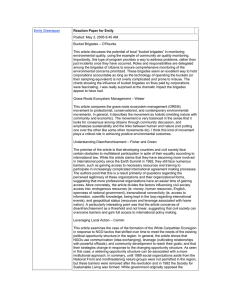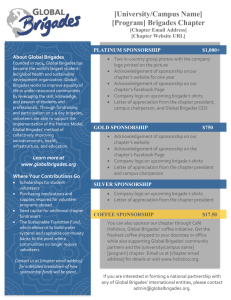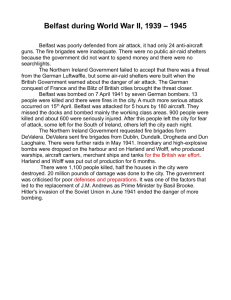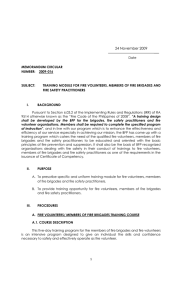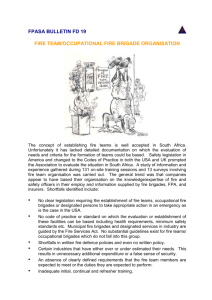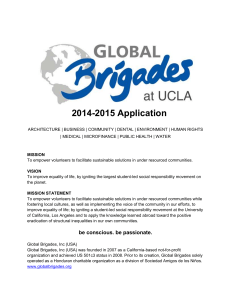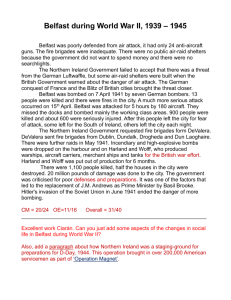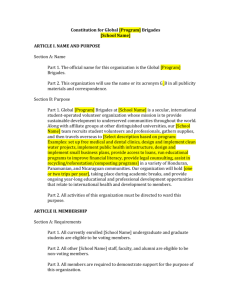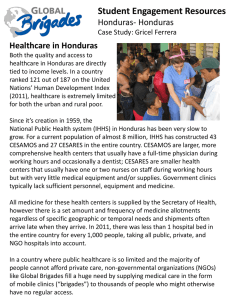INTERNATIONAL BRIGADES IN THE SPANISH CIVIL WAR
advertisement
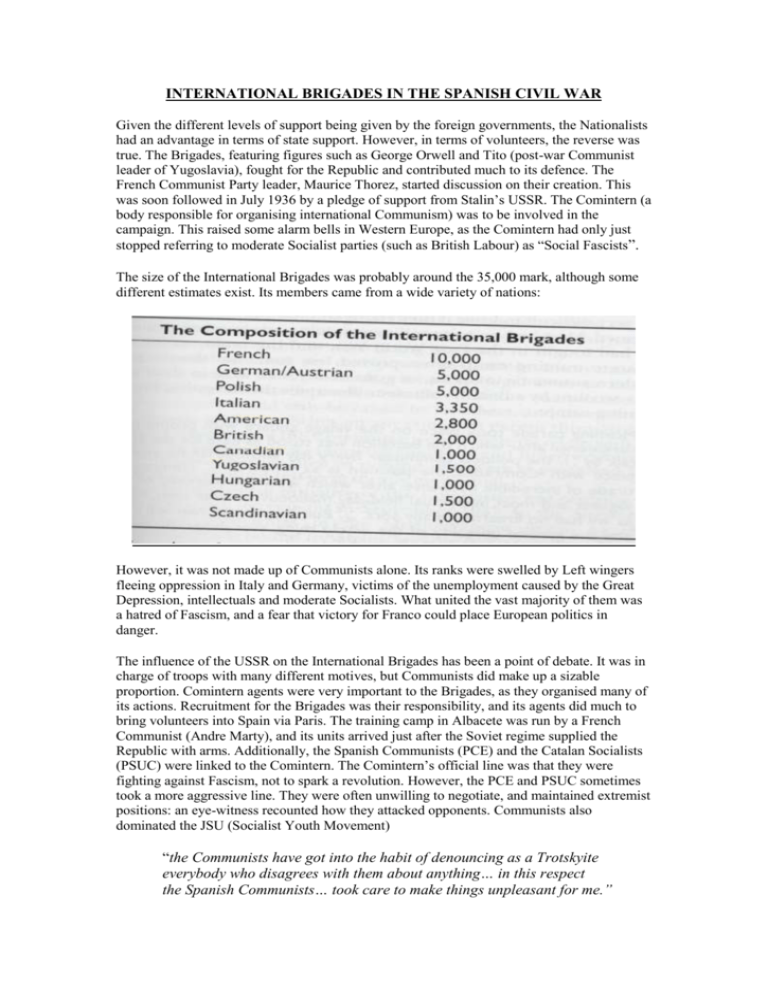
INTERNATIONAL BRIGADES IN THE SPANISH CIVIL WAR Given the different levels of support being given by the foreign governments, the Nationalists had an advantage in terms of state support. However, in terms of volunteers, the reverse was true. The Brigades, featuring figures such as George Orwell and Tito (post-war Communist leader of Yugoslavia), fought for the Republic and contributed much to its defence. The French Communist Party leader, Maurice Thorez, started discussion on their creation. This was soon followed in July 1936 by a pledge of support from Stalin’s USSR. The Comintern (a body responsible for organising international Communism) was to be involved in the campaign. This raised some alarm bells in Western Europe, as the Comintern had only just stopped referring to moderate Socialist parties (such as British Labour) as “Social Fascists”. The size of the International Brigades was probably around the 35,000 mark, although some different estimates exist. Its members came from a wide variety of nations: However, it was not made up of Communists alone. Its ranks were swelled by Left wingers fleeing oppression in Italy and Germany, victims of the unemployment caused by the Great Depression, intellectuals and moderate Socialists. What united the vast majority of them was a hatred of Fascism, and a fear that victory for Franco could place European politics in danger. The influence of the USSR on the International Brigades has been a point of debate. It was in charge of troops with many different motives, but Communists did make up a sizable proportion. Comintern agents were very important to the Brigades, as they organised many of its actions. Recruitment for the Brigades was their responsibility, and its agents did much to bring volunteers into Spain via Paris. The training camp in Albacete was run by a French Communist (Andre Marty), and its units arrived just after the Soviet regime supplied the Republic with arms. Additionally, the Spanish Communists (PCE) and the Catalan Socialists (PSUC) were linked to the Comintern. The Comintern’s official line was that they were fighting against Fascism, not to spark a revolution. However, the PCE and PSUC sometimes took a more aggressive line. They were often unwilling to negotiate, and maintained extremist positions: an eye-witness recounted how they attacked opponents. Communists also dominated the JSU (Socialist Youth Movement) “the Communists have got into the habit of denouncing as a Trotskyite everybody who disagrees with them about anything… in this respect the Spanish Communists… took care to make things unpleasant for me.” Campaigns of the Civil War The first involvement of the Brigades came in Madrid, with the Republican forces in a bad state. As General Mola was poised for success, the Republic’s Minister for War (Miaja) was given the responsibility of forming a Defence Council on 6th November. Few rated its chances of victory. However, Franco was otherwise occupied at this time of crisis. The International Brigades’ first units arrived on 8th November, mainly consisting of Europeans. One of the most famous of these Brigades was named “Thaelmann”, after the German Communist leader. Led by General Kleber, their arrival led to raised morale, and their training helped them pass on knowledge about military matters to civilians. Many Germans were amongst these troops, and given Hitler’s treatment of them they had little motive to leave the fight no matter how bad. The campaign soon became intense, with hand-to-hand combat breaking out in the University’s buildings by mid-November. Slogans such as “they shall not pass” and “Madrid will be the tomb of Fascism” became common, and the words of Dolores Ibarruri (“Pasionaria”) were heard supporting the Republic: “Better to die on your feet than live on your knees” “Better to be the widow of a hero than the wife of a coward” However, the campaign turned against them: towards the end of Madrid, they were absorbing much of the punishment with high casualty numbers. The Brigades had been valiant, but eventually lost. In Guadalajara, they enjoyed success over Italian troops. However, whether this victory ever had the potential to be decisive is debatable. One aspect of it could have turned matters. Documents captured by them proved that Italians fighting in the war were soldiers, not volunteers. This amounted to a clear breach of the Non-Intervention Pact, and was presented to the Committee. However, the evidence was not accepted and no action was taken. By 1938, their existence was becoming a problem. On 25th September 1938, the head of the Republican government (Negrin) announced that they would have to leave for diplomatic reasons. Their position as heroes to many was reflected by Pasionaria’s words: “You can go with pride. You are history. You are legend. You are the heroic example of the solidarity and universality of democracy.” Flag presented to International Brigade Volunteers on their departure, Barcelona 1938.
